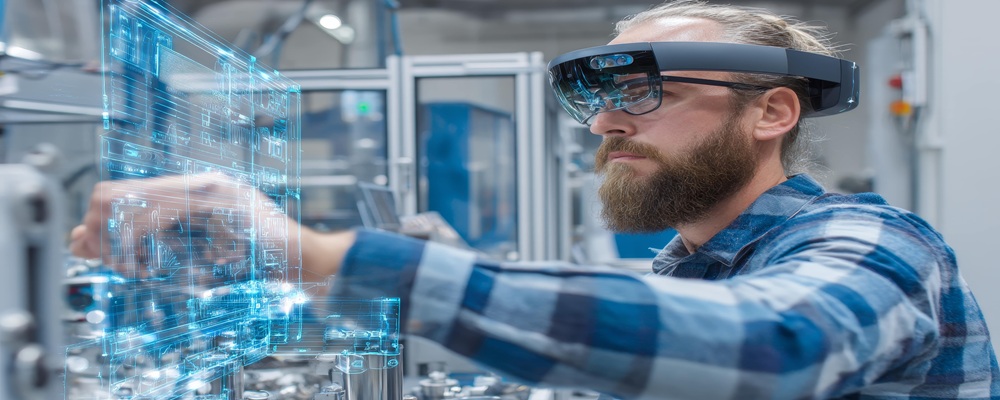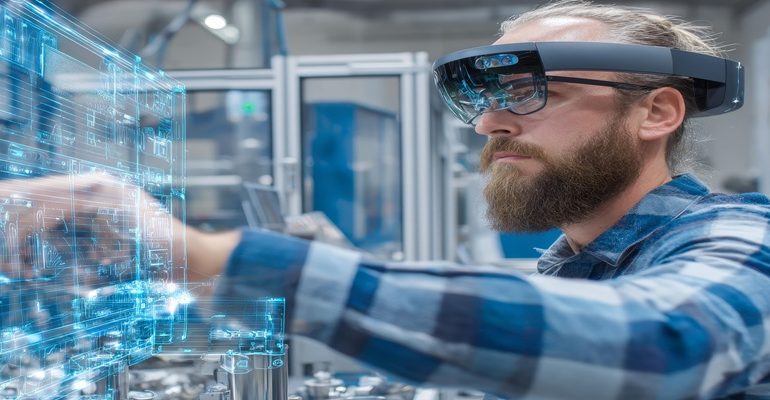
Extended Reality (XR) and Its Role in Business Transformation

Extended Reality (XR) and Its Role in Business Transformation
In today’s fast-evolving digital landscape, Extended Reality technology (XR) is emerging as a game-changer across industries. As a fusion of Augmented Reality (AR), Virtual Reality (VR), and Mixed Reality (MR), XR is not just a buzzword – it’s a powerful set of immersive tools that are transforming the way businesses operate, innovate, and engage with customers.
Whether you are a tech leader or a business owner seeking future-proof solutions, understanding XR is crucial to staying ahead in the digital age. In this blog, we’ll break down what XR really is and how it’s revolutionizing industries through immersive, intelligent experiences.
What is Extended Reality (XR)?
Extended Reality (XR) is an umbrella term that includes all immersive technologies – AR, VR, and MR. These technologies extend or replace reality by overlaying or simulating digital content in the user’s physical environment.
- Augmented Reality (AR) adds digital elements to a live view, often using smartphone or tablet cameras. Example: AR filters on social media or AR-enabled user manuals.
- Virtual Reality (VR) creates a fully immersive digital environment, typically using headsets like Meta or HTC Vive, cutting off the real world completely.
- Mixed Reality (MR) blends the real and virtual worlds, allowing digital and physical objects to interact in real time.
Together, these technologies make up XR, offering businesses a spectrum of immersive experiences tailored to their industry needs.
The Role of XR in Business Transformation
The true potential of extended reality technology lies in its ability to transform how businesses train employees, design products, market services, and interact with consumers. Here’s how XR is disrupting various industries:
Training & Education
XR enables interactive, hands-on learning in a risk-free environment. For industries like manufacturing, aviation, and healthcare, XR-based training offers simulations that mimic real-life scenarios without physical consequences.
- Faster onboarding
- Reduced training costs
- Improved knowledge retention
A metaverse development company offering XR-based learning modules can help organizations scale this training across locations, enhancing workforce efficiency globally.
Product Design and Prototyping
In sectors such as automotive and architecture, XR allows teams to visualize 3D models in real-time, make design changes instantly, and collaborate remotely.
- Faster prototyping
- Reduced time-to-market
- Better collaboration between teams
This reduces the need for multiple physical prototypes, saving time and money in the product development lifecycle.
Remote Collaboration
XR facilitates real-time collaboration between remote teams through shared virtual workspaces. Teams can interact with 3D models, data visualizations, and each other – bridging physical distances.
In a world shifting toward hybrid work, XR solutions make remote teamwork more engaging and effective than traditional video calls.
Sales and Customer Engagement
Businesses can use XR to offer customers immersive experiences that drive engagement and increase conversions.
Examples:
- Virtual product demos
- 3D try-ons for fashion and retail
- Interactive real estate tours
By adding interactive elements through extended reality technology, companies can stand out in crowded digital marketplaces.
Marketing and Brand Experiences
Forward-thinking brands are collaborating with a metaverse company in India or globally to build branded virtual environments. Whether through VR showrooms or AR-based campaigns, these experiences leave a lasting impression and boost brand recall.
Real-World Examples of XR in Business
Let’s explore some successful implementations of XR across industries:
- Manufacturing: Companies are using XR to optimize factory layouts, train employees, and simulate hazardous environments.
- Healthcare: Doctors and medical students are practicing surgeries using VR simulations, improving accuracy and confidence without real-world risk.
- Retail: Brands like IKEA use AR to let users visualize furniture in their homes before buying. This increases customer satisfaction and reduces return rates.
- Real Estate: Virtual property walkthroughs help buyers explore multiple properties from anywhere in the world, shortening the buying cycle.
XR and the Metaverse
As the concept of the metaverse gains traction, XR is the foundation that brings this virtual universe to life. The metaverse is a collective digital space where users interact through avatars, attend events, shop, and collaborate.
To make the metaverse immersive, responsive, and realistic, businesses rely heavily on extended reality technology. By partnering with a skilled metaverse development company, organizations can build scalable, secure, and interactive virtual environments for training, commerce, and entertainment.
Why Should Businesses Invest in XR?
The global XR market is projected to grow exponentially over the next few years, with industries across the board investing in XR solutions. Here’s why your business should act now.
- Competitive Advantage: Early adopters of XR gain a significant edge in innovation.
- Customer Expectations: Today’s customers expect interactive and personalized experiences.
- Operational Efficiency: XR reduces costs, enhances productivity, and simplifies complex tasks.
By working with a metaverse company in India, businesses can access world-class XR talent at competitive pricing, ensuring high ROI and fast deployment.
Choosing the Right XR Partner
Not all XR providers are the same. When looking for an XR or metaverse development company, ensure they offer:
- End-to-end XR development
- Cross-platform compatibility
- Customization to your industry
- Post-deployment support
A reliable XR partner can guide you from concept to deployment, ensuring your XR strategy aligns with your business goals.
Summary
Extended Reality technology is not just a trend – it’s a strategic tool that’s redefining how we interact with the digital world. From boosting operational efficiency to creating unforgettable customer experiences, XR is poised to become a cornerstone of digital transformation.
Businesses that embrace XR today will be the leaders of tomorrow’s immersive economy. Whether you’re in manufacturing, healthcare, retail, or education, investing in XR is no longer optional – it’s essential.
If you’re looking to integrate XR into your digital roadmap, consider partnering with Sapizon Technologies to unlock the full potential of immersive technology.